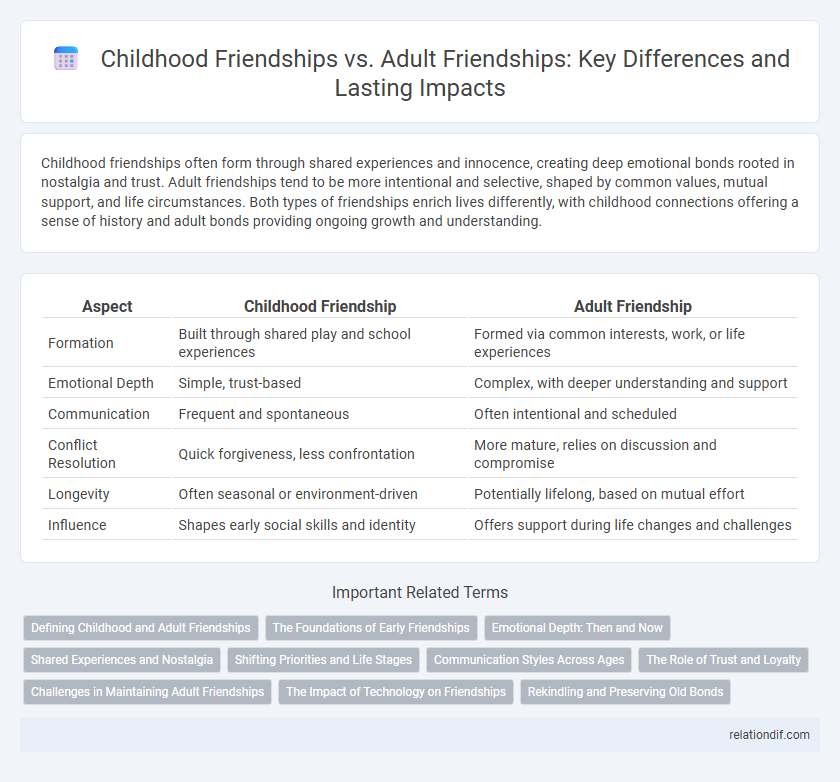Childhood friendships often form through shared experiences and innocence, creating deep emotional bonds rooted in nostalgia and trust. Adult friendships tend to be more intentional and selective, shaped by common values, mutual support, and life circumstances. Both types of friendships enrich lives differently, with childhood connections offering a sense of history and adult bonds providing ongoing growth and understanding.
Table of Comparison
| Aspect | Childhood Friendship | Adult Friendship |
|---|---|---|
| Formation | Built through shared play and school experiences | Formed via common interests, work, or life experiences |
| Emotional Depth | Simple, trust-based | Complex, with deeper understanding and support |
| Communication | Frequent and spontaneous | Often intentional and scheduled |
| Conflict Resolution | Quick forgiveness, less confrontation | More mature, relies on discussion and compromise |
| Longevity | Often seasonal or environment-driven | Potentially lifelong, based on mutual effort |
| Influence | Shapes early social skills and identity | Offers support during life changes and challenges |
Defining Childhood and Adult Friendships
Childhood friendships are often characterized by spontaneous play, shared experiences, and emotional dependency that fosters trust and loyalty during formative years. Adult friendships tend to be defined by mutual respect, deeper emotional support, and shared values that develop through life experiences and personal growth. The key distinction lies in the evolving nature of friendship needs, where childhood bonds focus on innocence and discovery, while adult friendships emphasize stability and meaningful connection.
The Foundations of Early Friendships
Childhood friendships are built on shared experiences, play, and the development of social skills, creating a strong emotional foundation rooted in trust and innocence. These early bonds often shape personality and influence future relationships by providing a safe environment for empathy and cooperation. In contrast, adult friendships typically emphasize mutual interests, emotional support, and life experiences, reflecting matured social dynamics and deeper understanding.
Emotional Depth: Then and Now
Childhood friendships are often rooted in shared experiences and innocence, creating a foundation of loyalty and trust that feels effortless and pure. Adult friendships, while sometimes harder to maintain, tend to possess greater emotional depth due to increased self-awareness, life challenges, and meaningful conversations about personal growth. The emotional complexity in adult friendships reflects a maturation that combines vulnerability with a strong commitment to mutual support.
Shared Experiences and Nostalgia
Childhood friendships are deeply rooted in shared experiences that shape early development and create lasting emotional bonds through play, school, and formative milestones. Adult friendships often emphasize mutual support and understanding, yet nostalgia for those carefree childhood moments strengthens connections and rekindles a sense of belonging. The interplay of past memories and present realities fosters a unique dynamic that enriches both types of friendships.
Shifting Priorities and Life Stages
Childhood friendships often center around shared play and daily proximity, reflecting simpler priorities such as fun and immediate support. In contrast, adult friendships tend to emphasize emotional depth, mutual understanding, and balancing responsibilities shaped by career, family, and personal growth. Life stages influence how friendships evolve, with adults valuing quality and trust over quantity and convenience.
Communication Styles Across Ages
Childhood friendships often rely on shared activities and nonverbal communication, with simple language and play-based interaction forming the foundation of connection. Adult friendships prioritize verbal communication, with nuanced conversations, emotional support, and problem-solving dialogues becoming central to maintaining bonds. Differences in communication styles reflect developmental stages, where childhood friendships emphasize immediacy and fun, while adult friendships value depth and mutual understanding.
The Role of Trust and Loyalty
Childhood friendships are often built on shared experiences and a foundational sense of trust that develops through early life interactions, creating deep-rooted loyalty. Adult friendships rely more on mutual respect, consistent support, and the ability to navigate complex emotional landscapes, which strengthens trust over time. Both forms of friendship highlight loyalty as a critical factor, but adult friendships demand a more conscious effort to maintain trust amid varied life responsibilities.
Challenges in Maintaining Adult Friendships
Childhood friendships often thrive on shared experiences and frequent interactions, while adult friendships face challenges like limited time due to work, family commitments, and geographical distance. Maintaining adult friendships requires intentional effort to communicate and prioritize connections despite busy schedules. Emotional changes and evolving personal values can also create barriers, making sustained adult friendships more complex to nurture.
The Impact of Technology on Friendships
Childhood friendships often rely on in-person interactions and shared experiences, while adult friendships increasingly depend on digital communication platforms such as social media, messaging apps, and video calls. Technology enables maintaining long-distance friendships and fosters connection despite busy schedules, yet it can reduce the depth of emotional bonding due to less face-to-face contact. The impact of technology on friendships shapes the dynamics of trust, intimacy, and frequency of interactions in both childhood and adulthood social networks.
Rekindling and Preserving Old Bonds
Childhood friendships often carry a deep sense of nostalgia and shared history that can be rekindled through meaningful conversations and revisiting past experiences. Adult friendships require intentional effort to preserve, balancing busy schedules while maintaining trust and mutual support. Rekindling old bonds strengthens emotional resilience and creates a lasting foundation for lifelong connection.
Childhood friendship vs Adult friendship Infographic

 relationdif.com
relationdif.com